Academic Plan Extension 2024-2026






Lakehead University respectfully acknowledges its campuses are located on the traditional lands of Indigenous Peoples.
Lakehead Thunder Bay is located on the traditional lands of the Fort William First Nation, Signatory to the Robinson Superior Treaty of 1850. Lakehead Orillia is located on the traditional territory of the Anishinaabeg. The Anishinaabeg include the Ojibwe, Odawa, and Pottawatomi nations, collectively known as the Three Fires Confederacy.
Lakehead University acknowledges the history that many nations hold in the areas around our campuses, and is committed to a relationship with First Nations, Métis, and Inuit Peoples based on the principles of mutual trust, respect, reciprocity, and collaboration in the spirit of reconciliation.
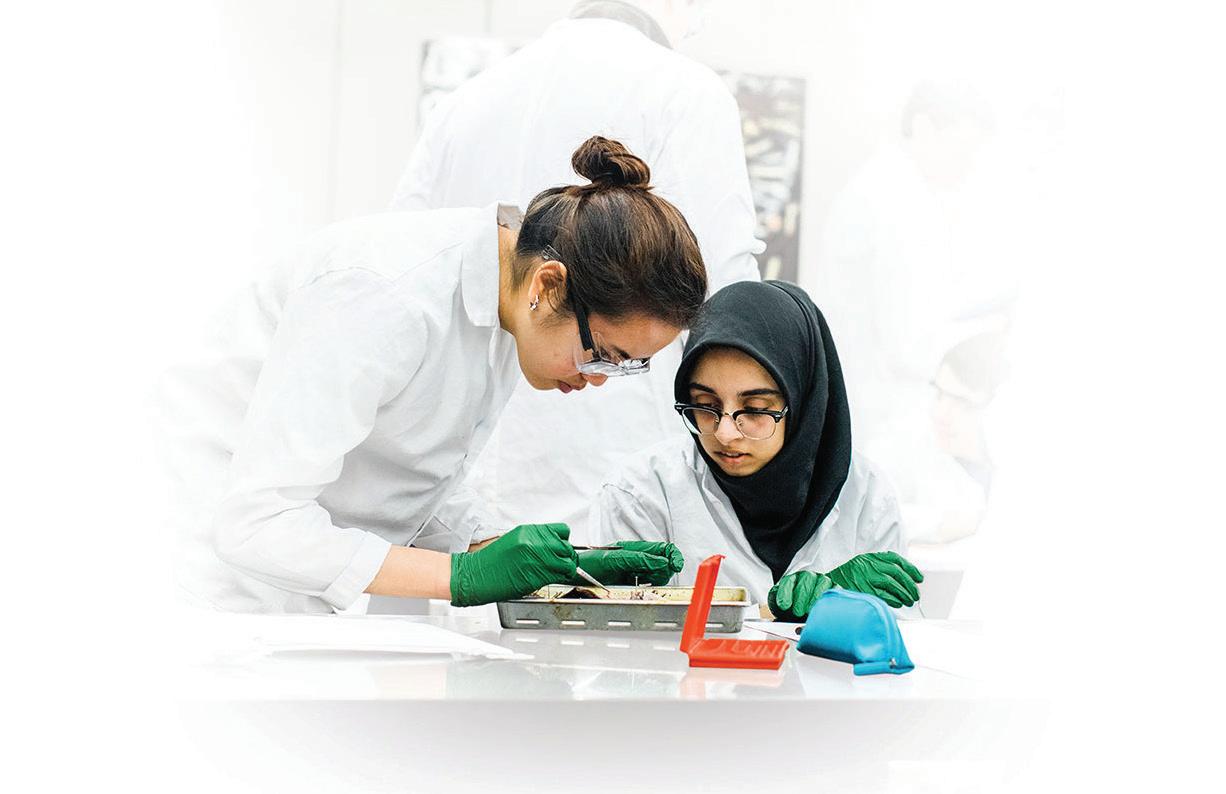
The Academic Planning Committee was established in the 2017/18 academic year. The Committee shaped the development of the 2019-2024 Academic Plan, engaging with stakeholders across the university community and advising the development of the priorities, strategies, actions and metrics outlined in this Plan.
Membership of the Academic Planning Committee:
DR. DAVID BARNETT
Provost & Vice-President (Academic)
DR. TODD RANDALL
Chair of Senate Academic Committee and Dean, Faculty of Science and Environmental Studies
DR. CHANDER SHAHI
Dean, Faculty of Graduate Studies
DAVID BLAIKIE Faculty of Law
DR. AMANDA DIOCHON
Department of Geology
DR. RUPERT KLEIN
Department of Psychology
DR. SREE KURISSERY
Department of Sustainability Sciences
DR. CONNIE RUSSELL
Faculty of Education
DR. HERMAN VAN DEN BERG
Faculty of Business Administration
HARLEEN BHULLAR
Student Representative
BRYSON IRVINE
Student Representative
EX-OFFICIO MEMBERS
DR. NANCY LUCKAI
Deputy Provost
KAREN KEILLER
University Librarian and ViceProvost (Teaching & Learning)
JAMES ALDRIDGE
Vice-Provost (International)
DENISE BAXTER
Vice-Provost (Indigenous Initiatives)
DR. HEATHER MURCHISON
Vice-Provost (Institutional Planning & Analysis)
ANDREA TARSITANO
Vice-Provost (Students) and Registrar
DR. BATIA STOLAR
Associate Vice-President (Research & Graduate Studies)
Mission
To be an innovative comprehensive university that provides an education that is about how to think, not what to think
Effort
Scholarship
Independence
Individuality
• Respect • Innovation • Commitment • Community • Honesty • Acceptance
• We believe our students, staff and faculty make Lakehead University different.
• We believe that our students, staff and faculty want an innovative comprehensive university where they have the highest chance of success.
• We believe that our students, staff and faculty have the passion and drive to realize their dreams and succeed.
• We believe that our students, staff and faculty want the intellectual freedom to pursue the unconventional.
• We believe in the diversity that comes from our students, staff and faculty of many cultures and nations.
• We believe that our students, staff and faculty are passionate about both their own individuality and their communities.
Lakehead University is committed to providing an exceptional and unconventional learning experience where students, staff and faculty from diverse backgrounds are encouraged to explore and understand the interconnections between their fields of study, communities and the broader world through research, scholarship, and experiential learning. The faculty and staff at Lakehead University are committed to the success of our students and the broader communities that we serve throughout Northwestern Ontario and Simcoe County.

Extension of the Academic Plan to 2026
Lakehead University’s Academic Plan is a roadmap for the future that builds upon the strength of the University’s foundation and operationalizes the Strategic Plan.
In 2022, the Lakehead University Board of Governors extended the current Strategic Plan through to 2025. This decision reflected the time needed to transition to a phase of recovery following the disruption caused by the global pandemic before we could effectively engage on the development of the University’s next strategic plan.
To maintain alignment between the University’s strategic and academic plans, and recognizing the 2019-2024 Academic Plan remains relevant, the Senate Academic Committee subsequently extended the Academic Plan.
This extension will provide the time required to build a new Academic Plan that incorporates the vision of the next Strategic Plan while continuing to build upon the significant achievements made under the current Academic Plan. We recognize the need for stability following years of covid-related disruption and commit to engagement with the university community and external partners as we look to the future and how we can achieve our mission as a university.
The four interconnected Academic Priorities and associated strategies set out in this plan continue to set Lakehead University apart, reflecting who we are and what we strive to be. We reaffirm our commitment to providing an exceptional and unconventional learning experience to our diverse community of learners. These Academic Priorities are the foundation for making a real impact in the lives of our students and continue to present opportunities for our university community to make an impact in the lives of students, alumni, and in the communities and regions we serve through teaching, research and scholarly and creative activity.
I am proud of our collective accomplishments over the past number of years and look forward to working with you as we continue to work together across all faculties and departments to solve the world’s greatest challenges and to position Lakehead as a leader in sustainability, social justice and Indigenous education.
Dr. David W. Barnett
Provost and Vice-President (Academic)
Message from the Provost and Vice-President (Academic) from 2019-2024 Academic Plan
I am pleased to support Lakehead University’s 2019-2024 Academic Plan.
This Academic Plan has been developed with an appreciation of the nuances across faculties and Lakehead’s campuses in Thunder Bay and Orillia. Throughout the planning process, we heard from a diverse group of students, faculty and staff, and found consistency in the comments we received, specifically of the need to build on the progress we have made over the past few years through considered and determined changes that position us for continued success in the future.
Lakehead University’s 2019-2024 Academic Plan reaffirms our commitment to the core elements that make Lakehead an exceptional University and includes new strategies that will advance Lakehead as a leader in social justice, sustainability and innovation.
In support of Lakehead’s 2018-2023 Strategic Plan, this Plan articulates our commitment to academic excellence through the delivery of high-quality programs and conducting innovative research, scholarly and creative activity; our commitment to social responsibility; and Lakehead’s continued commitment to continuing to advance the Truth and Reconciliation Commission Calls for Action through education, dialogue, and partnership.
As a comprehensive regional university with campuses in Northwestern Ontario and Simcoe County, Lakehead University plays a crucial role in the social and economic fabric of these regions. Lakehead students are provided the opportunity to learn about the rich diversity of our local communities while exploring the broader issues that impact sustainable development across the globe. We challenge our students to bring global perspectives to local initiatives and local perspectives to global initiatives.
Lakehead University is uniquely positioned to continue to address the global challenges that impact our future. Our research expertise is wide-ranging, including social justice, sustainability, health care, advanced technologies and broad culturally significant work related to Indigenous and pan-northern issues. Our approach to highquality programming, combined with our focus on research and innovation, offers a unique opportunity for faculty, students and local and global partners to collaborate in new and innovative ways to address these issues and to contribute to solutions that impact us all.
We seek to further the development of an interdisciplinary learning environment where we bring together teaching, learning and research around topics that include environmental, community and economic sustainability. Through this alignment, we will continue to create lasting impact by contributing to solutions that address global challenges, while developing the next generation of highly skilled leaders and future changemakers with real life experience and diversity in perspective.
Through this Plan, Lakehead strongly reaffirms its commitment to helping students overcome barriers to accessing a high-quality university education. We are committed to increasing the local population’s participation rate in higher education as well as continuing to support internationalization of the academy through creating opportunities for learning and research both here at home and through global partnerships. Our strong partnerships with local colleges and
Indigenous educators will continue to be essential to supporting participation and the development of a highly skilled workforce in Northwestern Ontario and Simcoe County. Further, by continuing to expand opportunities for experiential and international learning opportunities throughout all programs, Lakehead will help students develop lived experience, strong networks and transferable skills that will continue to position Lakehead graduates for success in a rapidly evolving global environment.
This Plan is exciting and offers us all the opportunity to make lasting change in our institution by leveraging the opportunities provided by interdisciplinary partnerships, fostering a culture of entrepreneurship across all academic units, and ensuring everything we do is focused on student success, health and well-being while preparing our students for success beyond university.
Progress can only be achieved through strong leadership at the individual level throughout the University. To achieve the goals outlined in this Plan, we must all champion, support and enable changes in approach, culture, process and practice across the University, and act as stewards of change in our interactions with others. As a large organization we must find ways to be nimble, while also maintaining integrity in quality programming and high calibre research, scholarship and creative activity.
Dr. David W. Barnett
Provost and Vice-President (Academic)

Lakehead University’s Academic Plan is a roadmap for the future that builds upon the strength of the University’s foundation. This Plan lays out the University’s academic priorities with a focus on continuing to enhance our culture of academic excellence. The Academic Plan is designed to operationalize the Strategic Plan themes, guiding Lakehead University’s decision making and priorities, encouraging the University to be nimble, ambitious and innovative while working within fiscal constraints.
Building on our strengths
Lakehead University believes that teaching and research are inextricably linked and driven by a common focus on learning and creation of new knowledge. Lakehead’s research strengths support delivery of quality undergraduate and graduate programs of relevance to regional, national and international needs, directly contributing to local, regional and global social and economic development.
As a comprehensive, research-intensive university with campuses in Northwestern Ontario and Simcoe County, Lakehead continues to be recognized nationally and internationally for excellence in teaching, learning and research, and the high calibre of Lakehead graduates.
Established in 1965, Lakehead offers a diverse range of undergraduate and graduate programming within nine faculties: Business Administration, Education, Engineering, Health and Behavioural Sciences, Law, Natural Resources Management, Social Sciences and Humanities, Science and Environmental Studies, and Graduate Studies. The Lakehead Thunder Bay campus is home to the west campus of the Northern Ontario School of Medicine (NOSM) University.
Since its inception, Lakehead University has been committed to sharing theoretical and practical applications of knowledge, building experiential learning into the curriculum in all disciplines, involving students in research and engaging in community-based learning that leverages the unique geographic and social locations of our two campuses.
Lakehead’s students are also exposed to Indigenous worldviews throughout their program as a result of the University’s Indigenous Content Requirement (ICR), the first of its kind in Canada.
Lakehead plays a unique role in Ontario as a comprehensive regional university with a research-intensive focus. While Lakehead University is relatively small, it is consistently recognized as a leader in terms of research productivity and impact in Ontario and across Canada. Over the past few years, Lakehead University’s research capacity has experienced phenomenal growth. As a result, Lakehead has gained an international reputation for its research, innovation and quality of graduate training.
Lakehead University’s impact on the economic, social and cultural life of local communities drives Lakehead’s longstanding commitment to supporting student access to a university education, to helping students realize their potential and to sharing knowledge widely and fostering local and global innovation. Lakehead has a high proportion of students who have overcome barriers to education and has a proven track record in supporting students realize their potential, as evidenced by Lakehead’s strong graduate outcomes.
Lakehead University continues to adapt to the changing world in which we live, work, and operate. The global social, economic, and environmental contexts are shifting at a faster pace than ever before and show no sign of slowing. Technology continues to disrupt industry and society, presenting opportunities and challenges across all sectors.
Many social, economic, and environmental changes are magnified in the communities Lakehead serves, presenting real world challenges that Lakehead is well positioned to help address through innovative approaches to teaching, learning, research, and expanded community partnerships that are focused on developing the next generation of leaders equipped with the skills and experience required to address global challenges.
This presents an opportunity for Lakehead to develop regional education ecosystems in Northwestern Ontario and Simcoe County through expanded partnerships that align to these “grand” societal challenges, positioning Lakehead as a beacon, both locally and globally, as a leader in sustainability, social justice, and Indigenous education.
Focusing on responsive research and academic connections in regional communities, Lakehead will continue to support regional development, connection, and innovation.
Development of a regional education ecosystem includes not only opportunities to embed local challenges into the curriculum and expand research partnerships through community partnerships and innovation clusters, but also presents opportunities for expanded partnerships with Confederation College, Georgian College, and Indigenous education institutes and organizations, and other education providers with a focus on recognizing each other’s strengths and leveraging synergies to work, study and learn together.
Lakehead University’s continued commitment to address the Truth and Reconciliation Commission Calls for Action will result in increased cultural competency for all students, faculty, and staff and expanded opportunities for Indigenous learners, mutually beneficial community partnerships and opportunities for greater collaboration over the long term, all of which are fundamental to the development of a strong and resilient society.
Focusing on regional development, Lakehead University must continue to offer an academic environment that is accessible to a diverse student body, with a focus on supporting inclusion and social mobility to create a more equitable society.

Building on this foundation is the need to continue to embed diverse perspectives and learning opportunities into all aspects of teaching, learning, and enquiry through continued development of Indigenous content, local and global academic connections, and ongoing internationalization of Lakehead University, including expanding international learning opportunities for faculty and for students.
Lakehead graduates will be well positioned to transition into the world of work, which will increasingly require graduates who have been exposed to the types of interdisciplinary programming, worldviews, and diverse learning experiences Lakehead is uniquely positioned to offer. In the future Lakehead will continue to expand local, regional and international experiential learning opportunities across disciplines in new and innovative ways to further align teaching, learning and research around topics that include environmental, community, and economic sustainability and that connect classroom learning with practical experience.
Further, given the pace of change impacting public and private sector industries, lifelong learning and ongoing skills development will be essential in the years ahead, requiring innovative approaches to continuing education and professional upskilling across all faculties.
Lakehead is well positioned to steward a course for the future through its commitments to teaching and learning excellence, to high calibre research, scholarly and creative activity and to championing social progress resulting from its ongoing commitments to social responsibility and social justice.
This Plan is the result of the work of the Academic Planning Committee and was informed by input from numerous engagement sessions and opportunities for written input. Throughout 2018 the Academic Planning Committee sought input from the University community, including students, faculty, staff, the Ogimaawin Indigenous Education Council (formerly OAGC), Lakehead University’s Board of Governors, and alumni to help define Lakehead University’s academic planning priorities.
The hundreds of well-considered and constructive comments received from students, faculty, staff, alumni and external partners have informed Lakehead University’s Academic Plan and are articulated within the Plan’s Academic Priorities and Academic Strategies
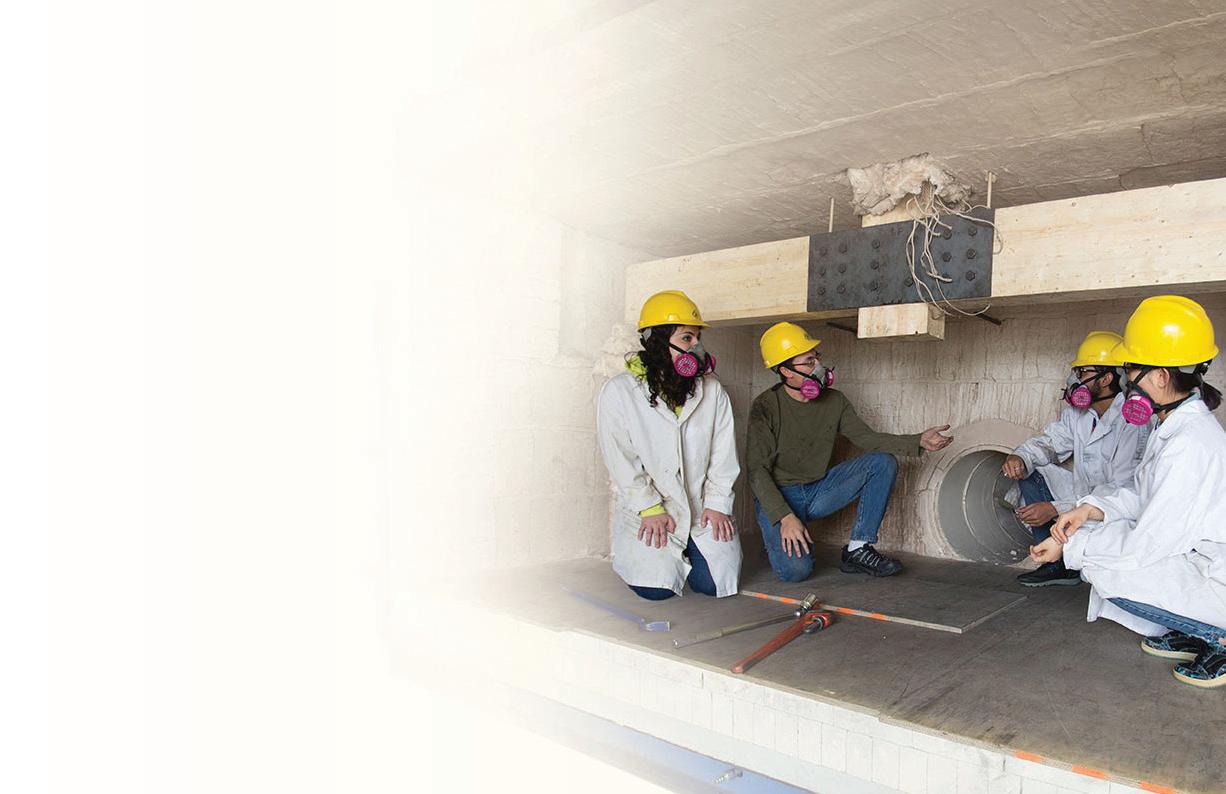
The overarching goal of Lakehead University’s Academic Plan is to support the realization of the University’s Academic Statement of providing an exceptional and unconventional student learning experience where students from diverse backgrounds are encouraged to explore and understand the interconnections between their fields of study and the broader world through research, scholarship, and experiential learning.
Lakehead University’s Academic Plan is built around four interconnected Academic Priorities, which represent key opportunities for transformational change at Lakehead: high-quality programs; innovative and impactful research, scholarship, and creative activities; commitment to social responsibility; and Anishinaabe Miikana Gichi Kendaasiwin
An interpretation of “Anishinaabe Miikana Gichi Kendaasiwin”, based on an Anishinaabemowin/Ojibwe translation, is:
Anishinaabe - “good people”, “original people”, “the spirit that is lowered to this place from above/people who were lowered here”
Miikana - “road”
Gichi Kendaasiwin - “higher learning, higher knowledge and education”
Acknowledgement: Developed in consultation with Lakehead University Elder’s Council and Regional Elders
At all levels of the University, the Academic Priorities and Strategies set out in this Plan must be pursued by linking academic goals to resource allocations that are fiscally sustainable and aligned with the university’s priorities.
Lakehead University is committed to an environment of integrated planning that coordinates strategic and academic planning, research priorities, space allocation and infrastructure programs, human resources, advancement efforts, and
financial and other services in support of Lakehead University’s academic mission.
Lakehead University’s Strategic and Academic Plans establish a general framework that informs multi-year budgeting, decision making, and priority setting exercises and enables individual academic and administrative units to build their plans.

A number of Academic Strategies have been developed to support achievement of these Academic Priorities with the goal of aligning with Lakehead’s Academic Statement and advancing the implementation of the University’s Strategic Plan. Each Academic Strategy includes a number of actions to be completed over the course of the Academic Plan.
These interdependent strategies will further enhance Lakehead’s academic impact in an increasingly complex world, positioning our students, staff, faculty, and graduates for success in a changing environment, while strengthening the communities in which we live, work, and study.
To achieve the goals set out in this Plan, all University units and functions must align with the Academic Plan, using it to inform day-to-day activities, long-term planning and emerging collaborations with faculty, staff, students, alumni, and local, global, and Indigenous partners.
• Gener a ting and suppor ting
• Eng ag ng w i th communi ties
• Ad vancing Tru th and Reconcilia tion
• Developing and sus t aining global per spec ti ves
• Championing inclusion
• Ad vancing i fe-long earning
• Developing people places and sys tems

Lakehead University affirms its commitment to delivering exceptional programming at the undergraduate and graduate levels. Lakehead University has a history of developing and delivering a broad range of high-quality programs to a diverse student population, exemplified by the strong employment outcomes of Lakehead alumni. Our dedicated faculty and staff remain focused on creating student centred, transformational learning experiences that prepare Lakehead graduates for success through the development of critical and lifelong learning skills.
Through the implementation of the Academic Plan, Lakehead University will continue to evolve and to develop new approaches to teaching and learning that meet the changing needs of the world we live in, reflect the shift to a connected, knowledge-based global economy and incorporate a sustainable approach to innovating for the future.
As we do this, Lakehead will continue to incorporate the best of what we do, including embedding experiential learning experiences and Indigenous content into every program, into the development of new and innovative high-quality learning options that continue to meet the evolving needs of learners who will operate in a multinational world.
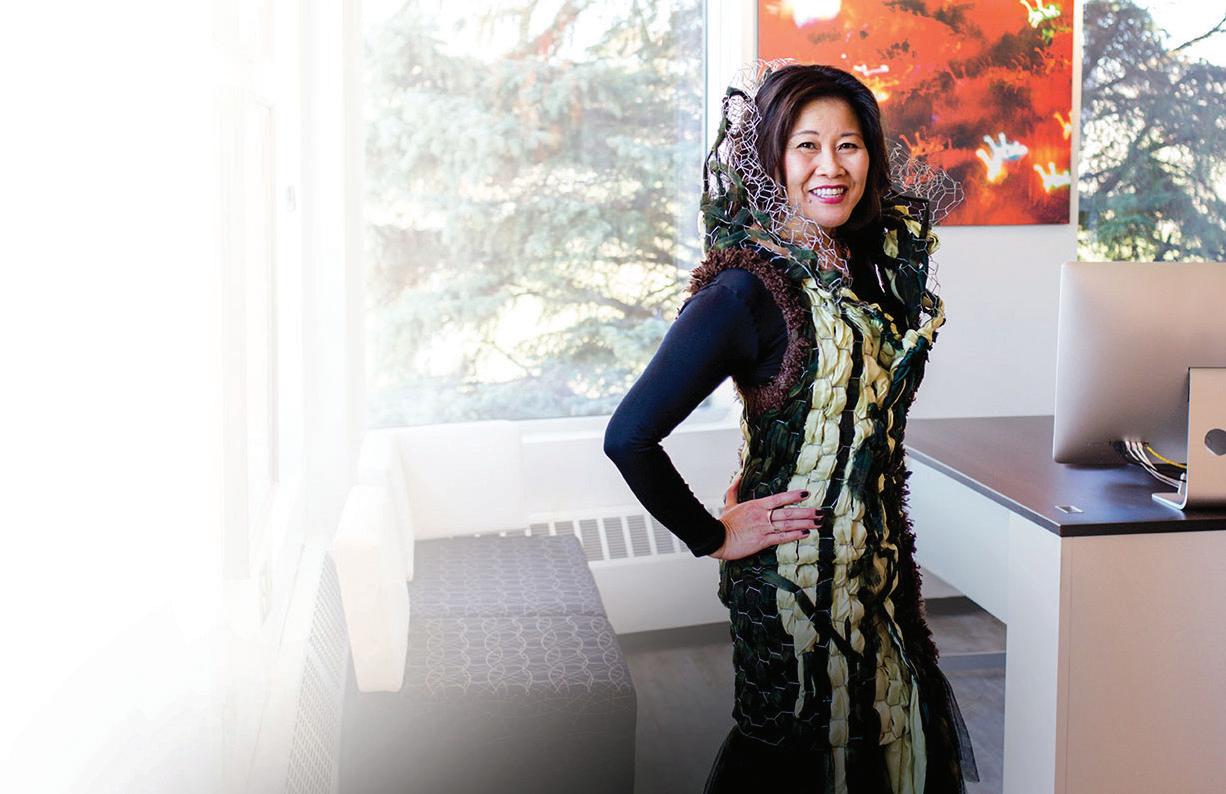
Lakehead University affirms its commitment to delivering exceptional programming at the undergraduate and graduate levels. Lakehead University has a history of developing and delivering a broad range of high-quality programs to a diverse student population, exemplified by the strong employment outcomes of Lakehead alumni. Our dedicated faculty and staff remain focused on creating student centred, transformational learning experiences that prepare Lakehead graduates for success through the development of critical and lifelong learning skills.
Through the implementation of the Academic Plan, Lakehead University will continue to evolve and to develop new approaches to teaching and learning that meet the changing needs of the world we live in, reflect the shift to a connected, knowledge-based global economy and incorporate a sustainable approach to innovating for the future.
As we do this, Lakehead will continue to incorporate the best of what we do, including embedding experiential learning experiences and Indigenous content into every program, into the development of new and innovative high-quality learning options that continue to meet the evolving needs of learners who will operate in a multinational world.
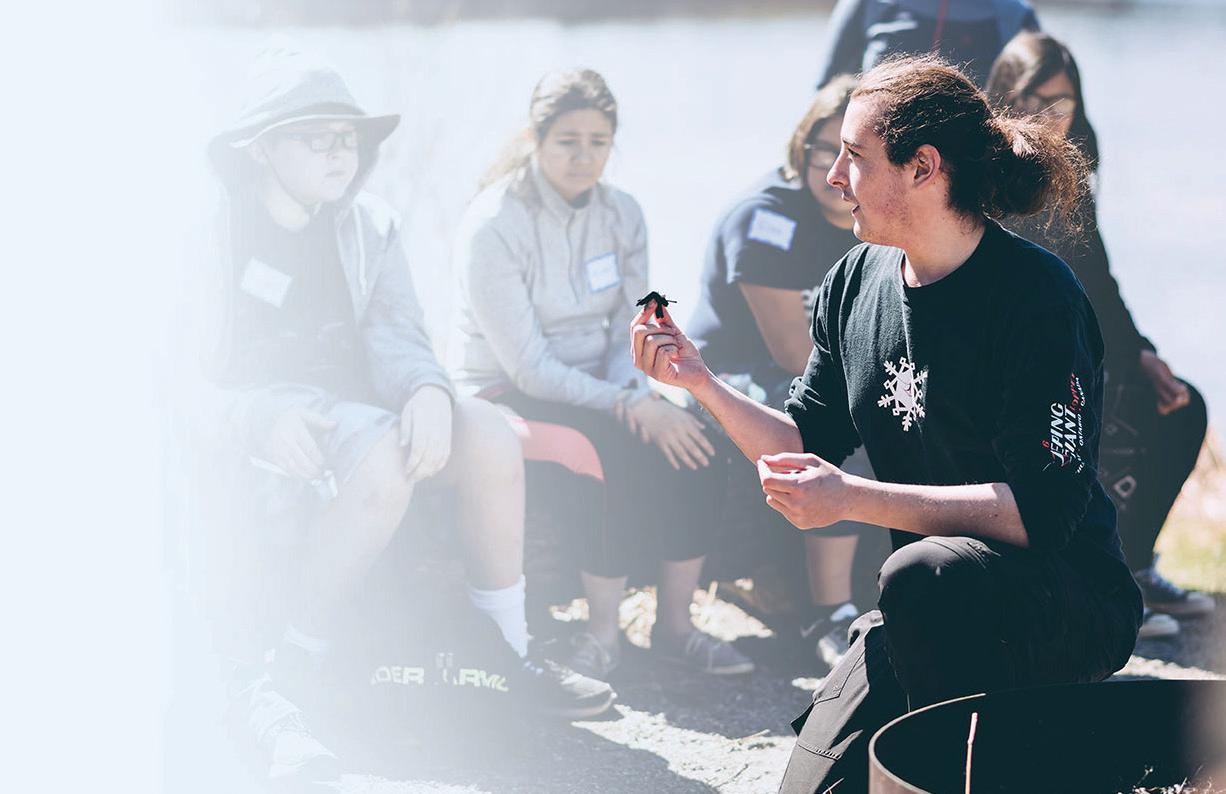
Through continued alignment of teaching, research, scholarly, and creative activities and community partnership around topics that include environmental, community and economic sustainability, Lakehead University will be a beacon, both locally and globally, as a leader in sustainability, social justice and Indigenous education, leading the development of creative solutions for some of the world’s greatest societal challenges.
As noted in Lakehead University’s Sustainability Action Plan, the University is committed to being a leader in sustainability, a pluralistic and inclusive concept that encompasses human and ecological health, social justice and equity, Indigenous rights, secure livelihoods, workplace wellbeing, and stewardship of vibrant and resilient communities.
Within this context, Lakehead is committed to advancing the United Nations Sustainable Development Goals, specifically in areas including access to education and social, cultural, and environmental sustainability and health and wellbeing.
The University’s commitment to these goals is evident in its approach to advancing equitable access to education, specifically for students from diverse backgrounds, including Indigenous students, students from rural and remote communities, students who are the first in their families to attend university, and students from equity-seeking groups.
Lakehead University believes in the transformational power of education and the opportunities that result from obtaining a university education, not only for the individual, but for their families, the communities they live and work in, and the broader impact they have on shaping the world around us. Our academic community is committed to continuing to provide the access, equity, and supports necessary for diverse learners to realize their potential and achieve their dreams while developing leaders and changemakers to inform solutions to challenging real world issues today and in the future.
Gichi Kendaasiwin

Lakehead University is committed to continuing to advance the Truth and Reconciliation Commission Calls for Action and Universities Canada Principles on Indigenous Education, recognizing that education is key to reconciliation and to the creation of a culture of understanding and appreciation throughout the University that will support a more equitable future for Indigenous people.
This includes reaffirming Lakehead University’s commitment to reducing the educational and employment gaps experienced by Indigenous Peoples in Canada by increasing the number of Indigenous students who pursue an undergraduate or graduate degree at Lakehead, and by increasing the number of Indigenous faculty and staff who work at the University.
Lakehead University appreciates that its response to the Truth and Reconciliation Commission Calls for Action must also focus on building understanding and appreciation among all students, staff and faculty.
This requires a renewal of Lakehead’s commitment to Lakehead’s Indigenous Content Requirement, which ensures all graduates of Lakehead University have been exposed to Indigenous worldviews through the program curriculum, and to enhancing Indigenous programming across disciplines.
It also requires Lakehead University to implement the strategies identified in the 2018-2023 Strategic Plan, reinforcing Lakehead’s commitment to examining and changing the University’s institutional policies and practices with a focus on advancing reconciliation through dialogue, debate, and cross-cultural exchange among all faculty and staff throughout the implementation of the Academic Plan.
It is important that the University recognize it must continuously develop and nurture intercultural competencies at all levels within the institution to support Indigenous students, staff, faculty, partners and communities and to find ways to succeed together. Development of intercultural competencies among faculty and staff will help support Indigenous students in their academic pursuits, attract Indigenous faculty and staff to work at Lakehead, and will help advance Lakehead’s continued commitment to enhancing Indigenous curriculum content and expanding opportunities to incorporate more traditional and land-based education into the curriculum.
As Lakehead continues to focus on an open and constructive dialogue among cultures, and to enhancing shared knowledge, Lakehead University recognizes the wisdom of Elders and Indigenous community partners to help inform decision making, research initiatives, academic programs, cultural spaces on campus and supports for students.
Lakehead will continue to deliver programs that support the skills needed in the future of work, are in demand, and that differentiate the University by bridging theoretical and experiential learning approaches in alignment with the Mission and Vision of the University.
To ensure the University continues to deliver high-quality programming that helps develop the leaders and changemakers of the future, Lakehead University is committed to actively engaging the University community in the review of all programs, partnerships, and pathways.
This review will help the University build on the knowledge and experience gained from the introduction of Lakehead’s Indigenous Content Requirement with a view of creating a more integrated vision of the contribution of Indigenous knowledge to the traditional university curriculum and culture. It will also help identify opportunities for alignment of teaching, learning, and research in environmental, community, and economic sustainability while employing practices that complement and enhance the existing Institutional Quality Assurance Process.
Furthering Lakehead’s commitment to delivering high-quality programs that equip graduates for the world of work, Lakehead will continue to provide an opportunity for all undergraduate and graduate students to access practical learning experiences such as work-integrated learning, labs, co-ops, placements and research with faculty during their program. Ensuring a higher proportion of students have the opportunity to participate in experiential learning and work-integrated learning opportunities will also help develop valuable professional networks our graduates can rely on throughout their career.
Lakehead’s commitment to high-quality programming will be demonstrated by the ability of our students to transition into the workforce and to continue their pursuit of graduate and postgraduate studies.
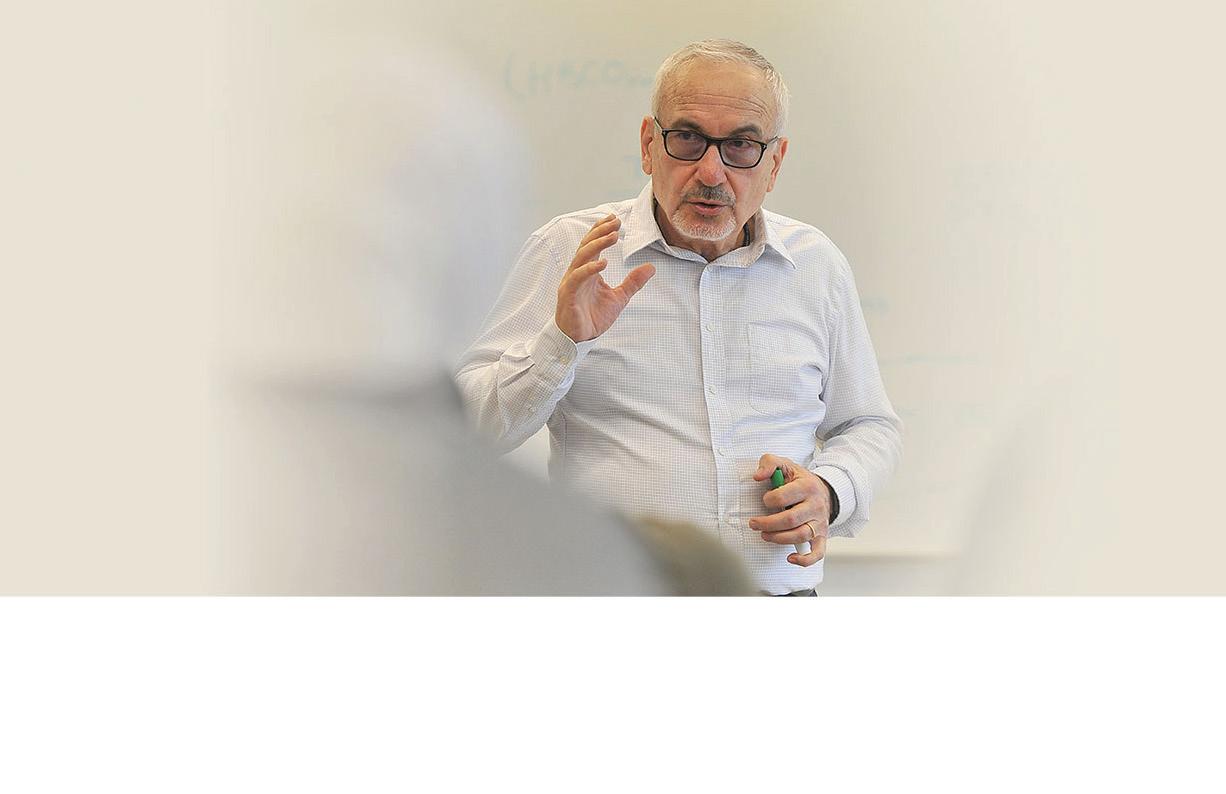
1. Actively engage the University community in the review of undergraduate and graduate degree programs with a focus on continuing to develop innovative, cross-disciplinary programming and delivery approaches to meet emerging labour market needs
2. Support and expand Indigenous programming and curriculum content at both the undergraduate and graduate levels
3. Continue to embed experiential learning opportunities into all programs, including land-based learning and community service learning that reflects Lakehead’s commitment to social and environmental justice and sustainability
4. Continue to support student innovation and entrepreneurship, including Indigenous student innovation and entrepreneurial activities, across disciplines with a focus on supporting interdisciplinary collaboration and applied learning inside and outside the classroom
5. Develop and implement strategies across all disciplines to promote academic, social and civic skills development inside and outside the classroom, including the development of intercultural competencies
1. Provide professional development and support to faculty and staff aimed at equipping all instructors with the necessary technical and pedagogical competencies to foster creative and critical excellence in their approach to teaching and learning and incorporate high impact practices into all programs
2. Provide skills-based training in intercultural competencies and diversity, equity, and inclusion to all faculty and staff in support of developing a more inclusive university culture and learning environment
2.1 Develop a Certificate in Intercultural Competencies for faculty and staff to support advancement of Truth and Reconciliation
2.2 Provide professional development for faculty and staff relating to equity, diversity, and inclusion at Lakehead University
To support Lakehead’s commitment to delivering high-quality programming, Lakehead University recognizes the need to continually enhance and celebrate teaching and learning excellence.
Through ongoing professional development delivered in collaboration with Lakehead’s Teaching Commons, Lakehead University faculty and staff will be equipped to embed new techniques, emerging technologies and further opportunities for experiential and work integrated learning across disciplines.
Opportunities for continued improvement of teaching and learning will be informed by student voices gained through consultation and feedback.
Through the delivery of skills-based training in intercultural competencies and diversity, equity, and inclusion to all faculty and staff, the University will continue to advance its commitment to Truth and Reconciliation and to developing an inclusive environment for everyone who works and studies at the University.
Professional development and intercultural competencies training will help foster a culture of collaboration, support, and mentoring among our faculty and staff, facilitating interdisciplinary partnerships and new ways of working together, driving promotion and celebration of excellence in teaching and learning.
3. Review Lakehead’s approach to student evaluation of teaching with a focus on capturing meaningful student input
4. Promote excellence in teaching and learning
4.1 Provide support and encouragement for faculty to apply to national and discipline-specific teaching awards
4.2 Promote excellence in teaching and learning through revised Teaching and Learning awards

Lakehead is committed to advancing access and equity for a diverse student body, and to embedding this commitment throughout every aspect of our institution as we continue to support social mobility and the promotion of opportunities for people aspiring to go to university.
Lakehead is committed to advancing access and equity for a diverse student body, and to embedding this commitment throughout every aspect of our institution as we continue to support social mobility and the promotion of opportunities for people aspiring to go to university.
Lakehead University serves regions where a lower proportion of the population attends university. Those who do pursue a postsecondary education often face multiple barriers to access, including temporary or permanent disabilities, being the first in their family or in their community to attend university, or overcoming significant geographic and financial barriers to access higher education. Others may not believe they have the qualifications to apply to university despite having the potential to succeed and thrive in a university environment.
Recognizing education is the foundation of a strong and resilient society, Lakehead University remains committed to supporting the development of innovative pathways to university, and to working with today’s youth to envision a future that includes the pursuit of higher education.
This includes working with local school boards, communities, colleges and Indigenous education institutes and organizations, and other education providers to help develop and articulate the multiple pathways to access Lakehead University, and developing flexible program and delivery options that reflect the needs of our diverse learners.
It also includes working with global partners and remote international communities who face similar barriers to accessing education, and who require a skilled workforce to support social and economic development.
Finally, this includes ensuring Lakehead’s faculty and staff reflect the diversity of our communities and mirrors potential to prospective students.
1.1 Enhance existing and develop new transition options for Indigenous learners
1.2 Reduce barriers to entry through remote and distance learning opportunities including online learning opportunities
1.3 Continue to build strong partnerships with Georgian College and Confederation College
1.4 Develop pathways between undergraduate and graduate programs to help students see their potential for achievement
1.5 Continue to expand upon the Gateway program and identify student groups that may benefit from additional support and mentorship
2. Continue to refine and expand partnerships with regional school boards, Confederation College, Georgian College, and Indigenous education institutes and organizations, and other education providers to create effective pathways to postsecondary education for people who face barriers to accessing higher education
3. Improve student mobility through the creation of expanded and flexible programming options including transfer pathways, transitional programming, online programming and compressed course offerings
1. Continue to proactively assess and enhance Lakehead’s suite of student supports to assist Lakehead’s diverse undergraduate and graduate students succeed academically and socially
2. Develop and implement a proactive and inclusive financial support and awards strategy that reflects the growing diversity of Lakehead’s undergraduate and graduate student population and various pathways to entry
3. Develop and implement a strategy to promote student awareness and use of academic and non-academic supports available at Lakehead
4. Ensure academic and non-academic policies, procedures and programs are accessible and accommodate diversity, with a focus on supporting student potential
Since its inception, Lakehead’s approach to accessible post-secondary education has focused not only on supporting students to get to university, but also on the ongoing provision of supports to help students achieve their academic potential while at university.
Lakehead serves a complex student body with diverse needs. Historically, over two-thirds of Lakehead’s undergraduate student population has faced multiple barriers to accessing university, including financial challenges, overcoming geographic and cultural barriers, and in some cases not only being the first in their family, but the first in their community to pursue a university education.
Despite these challenges, Lakehead University has one of the highest graduation rates in Ontario, and students rank Lakehead University as one of the top universities in the province that prepares them for employment, reflecting the fact that a higher proportion of Lakehead graduates are employed, and employed in their field, compared to the provincial average. Lakehead graduates will continue to be changemakers, contributing to finding solutions to local and global issues. These graduate outcomes speak to the importance of providing a wide range of supports to students to help position them for success inside and outside the classroom and to equip graduates with the diversity of skills required to meet the challenges of the future.
As university education becomes increasingly relevant in the future economy and acts as a contributor to social mobility, Lakehead University recognizes the need to continue to develop a comprehensive suite of academic, non-academic and cultural supports to meet the needs of our increasingly diverse learners and to help the University achieve its Academic Priorities.
5. Enhance Lakehead’s Co-op and Work-integrated Learning Services to help connect students to local, regional and international work integrated learning opportunities across disciplines
6. Enhance Lakehead’s Career Services at both Lakehead Orillia and Lakehead Thunder Bay to help students seamlessly transition into the workforce upon graduation
Through its research activity, Lakehead will continue to bring expertise to local communities and to private and public sector industry partners, supporting economic and social endeavours while contributing to solutions to global problems.
Lakehead’s institutional approach to supporting the growth of highquality research must build on successes achieved to date, balancing the need to focus scarce resources on areas of research strength in environmental, community and economic sustainability to grow the institution’s profile internationally, while at the same time ensuring it can offer the widest range of research expertise to address regional, social and economic challenges.
This will require increased interdisciplinary research collaborations with local partners in Northwestern Ontario and Simcoe County, as well as global partners, with a focus on addressing grand challenges including social, economic, and health inequalities and environmental issues.
Doing so presents a shared opportunity to bring the expertise of faculty, staff and students to contribute to solutions to regional, national and global challenges with local community partners and Indigenous communities while also offering expanded opportunities to teach in new and innovative ways.
By building applied research into the curriculum and embedding innovation and ingenuity across disciplines, Lakehead will continue to be a leader in research productivity and impact and will continue to offer research opportunities to undergraduate students while building graduate student capacity.
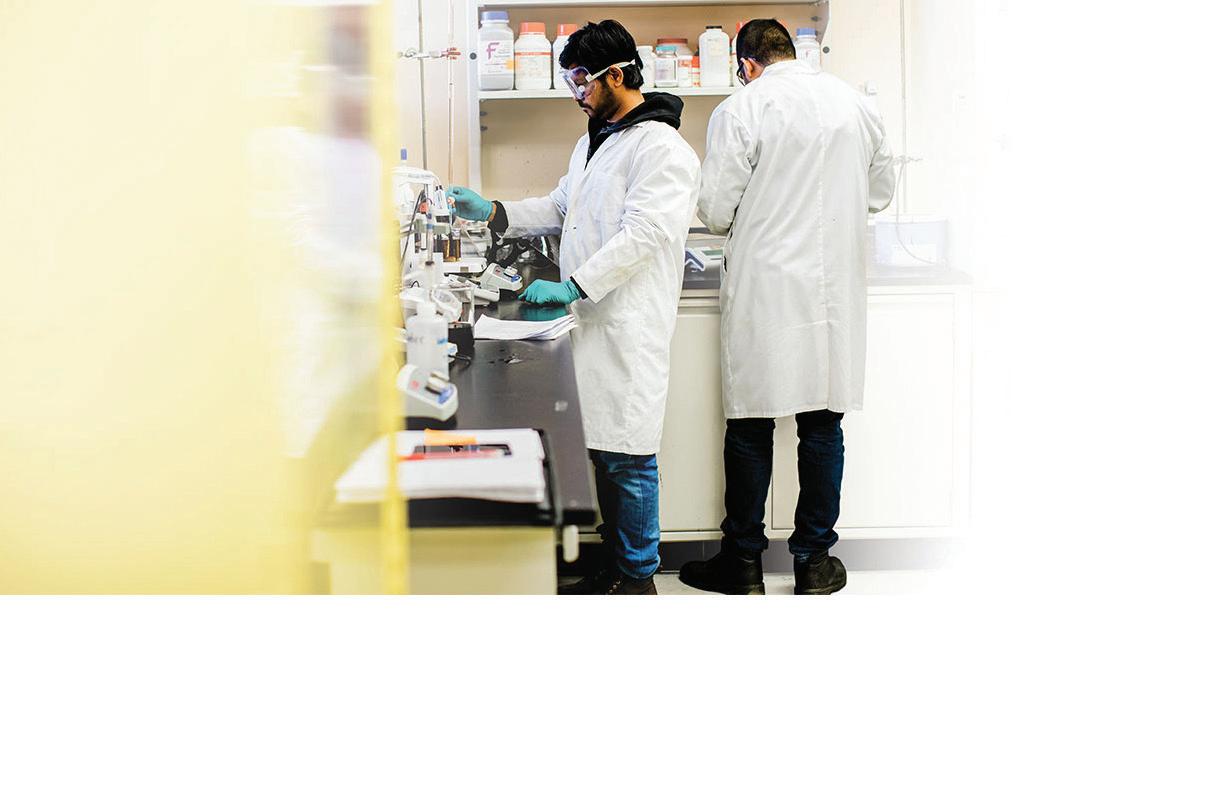
As a comprehensive regional university, Lakehead remains committed to leveraging local strengths, providing educational opportunities for the local population that respond to regional industry needs, and to addressing local challenges through collaboration, knowledge creation and exchange.
Continued engagement with local communities, Indigenous partners and industry to identify and respond to current and emerging skills needs is crucial to delivering on our mandate.
This includes partnering to identify and respond to local and regional educational needs to drive strong regional economies, as well as driving innovation through increased partnership with public and private sector industries.
Lakehead will also focus on the development of community-based partnerships. Through the development of this Plan, faculty, staff and students recognized opportunities for increased community-based teaching, learning and research, acknowledging there is much we can learn in working together to achieve common goals and address local societal challenges that contribute to global dissemination and application of knowledge.
Expanded partnerships and memorandums of understanding will enable enhanced undergraduate research and experiential learning opportunities with local communities and on-campus initiatives in areas related to sustainability and social justice while offering opportunities for local employers to work with Lakehead students and advance their own development.
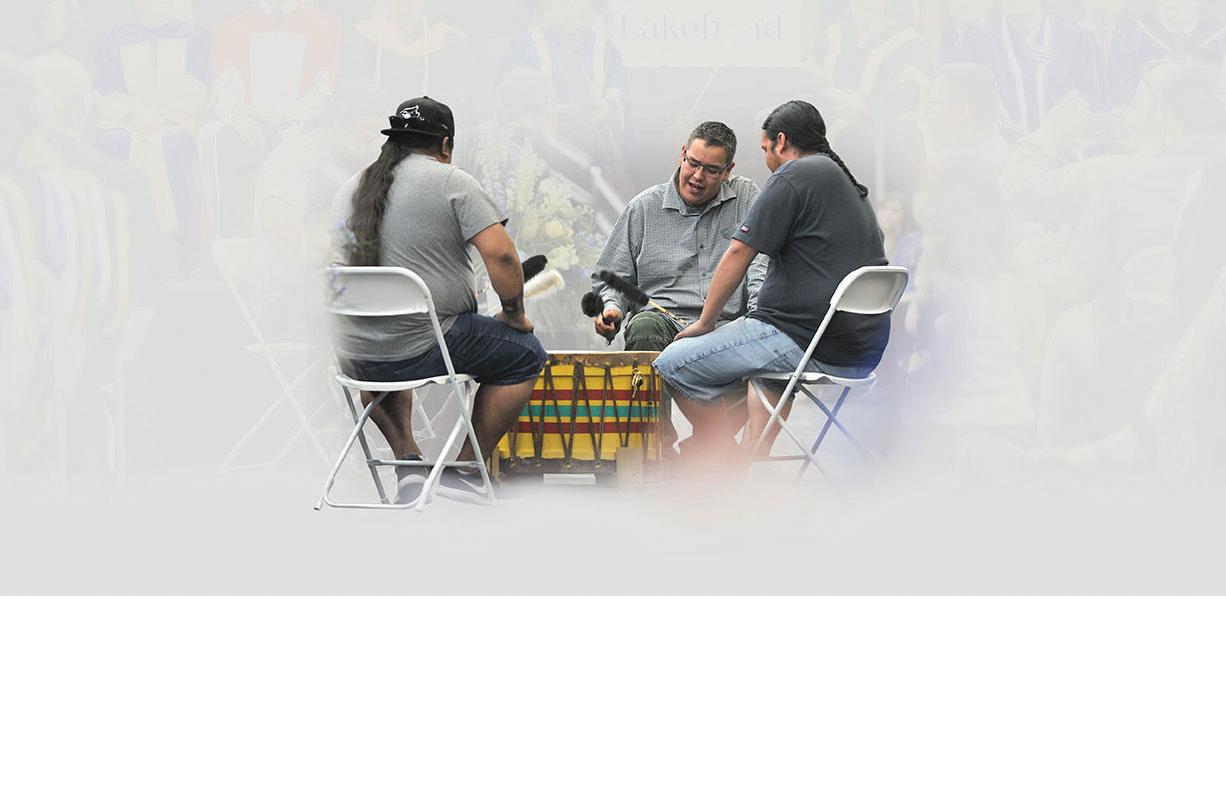
Lakehead University has made a significant commitment to advancing reconciliation. This includes ensuring flexible access to post-secondary education, offering Indigenous programming, providing strong academic and Indigenous cultural supports, engaging with the next generation of Indigenous learners through the Niijii Mentorship Program at Lakehead, and the introduction of a requirement to include Indigenous content in all programs.
As part of its commitment to social justice and social responsibility, Lakehead University will continue to advance the Truth and Reconciliation Commission Calls for Action and Universities Canada Principles on Indigenous Education.
The Truth and Reconciliation Commission recommendation to build capacity for “intercultural understanding, empathy and mutual respect” has become a guiding principle for the commitments Lakehead has made in both Northwestern Ontario and Simcoe County and will continue to guide our efforts in the future.
Lakehead will continue to develop greater awareness of Indigenous perspectives, cultures, histories and current events amongst the University’s faculty, staff and students with a focus on creating a culture of awareness and fostering positive and supportive relationships. This includes recognizing the wisdom Elders and Indigenous community partners bring to inform decision making, research, academic programs and supports and programming for students.
Acknowledging and responding to the importance of place, Lakehead University will develop a more comprehensive approach to opportunities for sharing culture through the enhancement and development of Indigenous teaching and learning spaces for Indigenous learners and the Indigenous community to maintain a presence across the University.
4.
Lakehead University recognizes excellence in teaching, learning and research depends on exposure to, and integration of, diverse perspectives.
Lakehead University is committed to embedding equity and inclusion into all systems, structures and practices through development of a shared understanding at every level of the University that equity, diversity, and inclusion are essential to the University’s academic environment.
Acknowledging inclusion is a precursor to access, social mobility and sustained success, Lakehead will continue to develop Lakehead’s culture to meet the needs of an increasingly diverse faculty, staff, and student body as part of its commitment to social responsibility.
This will include open communication and consultation between academic leadership and staff, faculty and students on equity, diversity, and inclusion to inform the implementation of policies and procedures that support an inclusive environment for all students, staff, and faculty.
As the University continues to support increasing diversity on campus, the University will educate and support staff and faculty to better understand and respond to matters of equity, diversity, and inclusion in a proactive manner.

Continuing to develop global perspectives through ongoing internationalization of Lakehead University campuses, curricula and research remains a crucial strategy in the 2019-2024 Academic Plan.
Lakehead University must continue to equip our graduates for the increasingly globalized environment they will work in through exposure to diverse perspectives gained through increasing diversity on campus, international exchanges and international work integrated learning opportunities at both the undergraduate and graduate degree level.
To achieve greater diversity on our campuses, Lakehead will continue to actively recruit international students and further expand opportunities for globally connected research and scholarship, building on the University’s reputation of academic excellence.
This continued internationalization of Lakehead University will increase the extent to which students, staff and faculty are exposed to multiple perspectives on global issues and will provide the university community with greater opportunity for international dialogue and collaboration inside and outside the classroom.
Faculty will also benefit from exchanges with international partners that provide an opportunity for greater collaboration and partnership on global challenges including environmental, community and economic sustainability. Exchanges also present an opportunity for faculty to be exposed to new perspectives and for Lakehead Thunder Bay and Lakehead Orillia to host international thought leaders in our local communities, further diversifying the perspectives in our academic community.
2. Increase the number of students and faculty who participate in exchange, short-term, and semester-long study abroad or work integrated learning, research collaboration, and international joint programs
3. Collaborate with global partners and international schools to increase the participation of international students
5. Continue to work with faculty to infuse global, international and intercultural topics into the curriculum across all disciplines
Review and revise processes and pathways to re-entry/readmission to facilitate a return to education for diverse learners
Expand compressed and flexible programming options across disciplines to support continued education for working professionals 3. Continue to develop certificates, micro-credentials, and modular courses across disciplines with a focus on environmental, community and economic sustainability, and local societal issues
As outlined earlier in this Plan, the world is evolving at a fast pace, impacting not only how traditional learners access education, but also requiring ongoing skills development to support continued progression and adaptation of those in the workforce.
As a result, Lakehead must find ways to respond to these emerging and evolving learning needs through improved processes to support a return to university, whether to complete a degree, embark on graduate studies, or to take a certificate or compressed program.
Within this context, there is a great opportunity for Lakehead University to review its approach to program delivery with a focus on opportunities for life-long learning in topical and traditional fields of knowledge for diverse learners.
This includes responding to the emerging societal need for flexible program delivery and stacked credentials with a focus on supporting access to post-secondary education, specifically for those in rural and remote locations locally and globally.
4. Develop international professional and post-graduate training opportunities across disciplines
5. Continue to develop regional nodes for professional program delivery with a focus on increasing access to education in northern communities through remote program delivery
The goals laid out in this Plan can only be advanced by a committed workforce of exceptional people, innovative classroom and campus space, and advanced technology.
Infrastructure to support teaching, learning and research is essential and increasingly important, while continued investment in our people through renewal and professional development is crucial to support Lakehead’s continued pursuit of knowledge and academic excellence.
To support the Academic Priorities outlined in this Plan, Lakehead University must continue to advance and evolve its coordinated effort to planning, budgeting, strategic enrolment management, and process improvement with a focus on identifying opportunities for reinvestment to continue to develop institutional capacity.
Our resources must be aligned to the University’s strategic and academic goals, recognizing we will have to make determined decisions in times of fiscal constraint to advance our Priorities.

We will:
1. Develop a plan to recruit and retain an optimal number of high-calibre full-time faculty and staff to support the advancement of Lakehead University’s Academic Priorities
2. Review and revitalize classroom and campus space at both Lakehead Thunder Bay and Lakehead Orillia to better support evolving pedagogy, curriculum delivery and research and learning needs across disciplines
2.1 Plan and implement an iterative approach to classroom revitalization to support innovations in pedagogy and an increased focus on active and experiential learning across disciplines
2.2 Incorporate Indigenous ways of knowing into the utilization of existing spaces and newly-created spaces
2.3 Develop a strategic approach to technology improvements across both campuses
2.4 Increase the availability of immersive technology-enabled spaces to support rural and remote learning
3. Centralize supports on each campus to advance new academic initiatives, including development of community partnerships to support community service learning and work-integrated learning opportunities for students, faculty and industry partners across all disciplines
4. Develop and implement a wellness strategy for Lakehead University that will embed mental and physical health and wellness into the campus culture
5. Continue to mature Lakehead’s approach to integrated planning, budgeting, and strategic enrolment management with a focus on alignment, fiscal stewardship, and resiliency across all units Update and revise back-office functions to support ongoing process improvement in alignment with the University’s Strategic and Academic Priorities
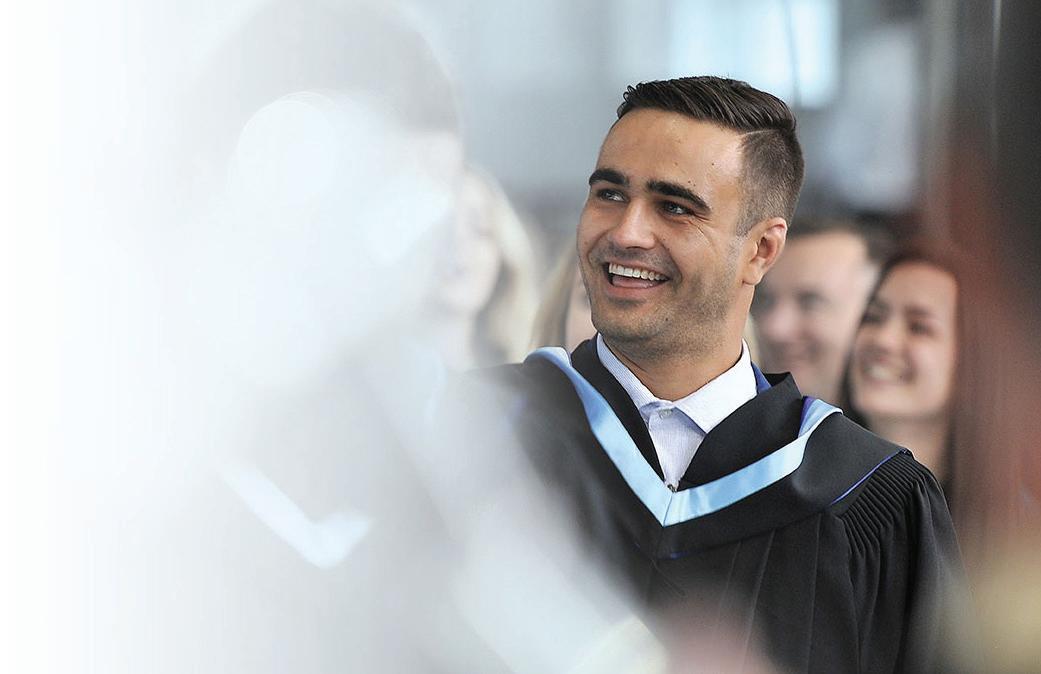
We will measure success through monitoring of the following indicators:
High-quality programs
• Increased overall enrolment to 10,000
• Increased graduate student enrolment
• Increased international student enrolment to 20% of overall enrolment
• Increased retention rate (Year 1-Year 2)
• Increased six-year graduation rate
• Increased student satisfaction (National Survey on Student Engagement)
• Increased students’ perceived gains in higher order learning outcomes (NSSE)
• Achieve 100% participation rate of senior-year students in experiential learning opportunities by 2024
• Increased number of work-integrated learning opportunities across disciplines
• The graduate employment rate two-years after graduation from a baccalaureate program will be above the provincial average
• The number of graduates employed in full-time jobs related to skills developed through their undergraduate degree will be above the provincial average
• 100% of programs at Lakehead University in all Academic Units will include articulated program and courselevel learning outcomes
• Increased number of faculty who are recognized through national teaching awards
• Increased number of postdoctoral fellows
• Increased number of Research Chairs to 25
• Increased overall per capita research funding at Lakehead University
• Increased participation of underrepresented student groups in specific disciplines
• Lakehead’s domestic student population will reflect the demographics and diversity in the regions served by the University
• Increased university participation rate for residents in Simcoe County and Northwestern Ontario
• Increased societal impact of Lakehead University
Anishinaabe Miikana Gichi Kendaasiwin
• Increased number of Indigenous undergraduate students, graduate students, postdoctoral fellows
• Increased Indigenous student six-year graduation rate
• Increased number of Indigenous faculty and staff
• Increased number of faculty and staff who have participated in intercultural competencies training
